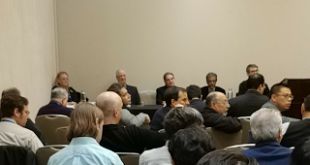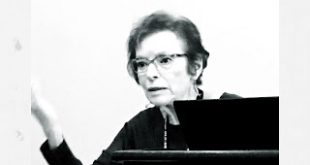New paper by Steve Keen. After Paul Romer accused mainstream colleagues of using phlogiston to explain phenomena they don't understand, now we have a better working hypothesis about what is happening with the mainstream. From the abstract: A new virus, known as ‘Reality’, has started to afflict Mainstream Economists, causing them to reject the ‘as if’ arguments they used to use to justify their models. There is no known cure for the virus, and complete avoidance of ‘Reality’ is the...
Read More »The Nature of Capitalism and Secular Stagnation
McCloskey, Lazonick, Despin, and Shaikh (I'm covered) The joint AEA/URPE session was very lively, but suffered from the last minute absence of Brad DeLong. He did send the notes of what he was going to discuss here. On the topic of stagnation per se only Hans Despin suggested that it was an important phenomenon, but not necessarily for the same reasons Larry Summers and Brad De Long. It was unclear to me, however, that his views were based on a demand side story, and, hence, that this...
Read More »An increase in rents is behind the rise in inequality
Eileen Appelbaum Eileen Appelbaum delivered the David Gordon Memorial Lecture at the Chicago Meetings of the Union of Radical Political Economics (URPE). The lecture, and the comments by John Schmitt will be published later in the Review of Radical Political Economics (RRPE). The gist of the argument is that ever stronger corporations use their dominant position in markets, patent and copyright protections, and their political influence to obtain favorable regulations and tax breaks to...
Read More »ICAPE and the Future of Pluralism in Economics
ICAPE is the acronym for the unwieldy named International Confederation of Associations for Pluralism in Economics. The organization has been somewhat inactive in the recent past, but it seems ready to increase its activities in the near future under the direction of my colleague Geoff Schneider. Here are his remarks on the future of Pluralism at the last ICAPE conference at Roosevelt University in Chicago.[embedded content]Program from last conference, where these remarks were presented is...
Read More »American Economic Association Meeting in Chicago
I'm off (URPE program here). Pretty busy, and won't post for a while. Talk to each other ;)PS: Mainstream micro is terrible at describing too, btw. And there are a few heterodox macro people that aren't that bad at describing.
Read More »Diffusion and technological change
Map above shows the spread of chess from its original invention in India to the rest of Eurasia. There is an interesting analogy here with the diffusion of a game and of technology. Technological diffusion is a slow process, but an essential one, in which a significant part of the improvements are made. Gun technology, which also started in Asia, and discussed here before, is another case in point. And sometimes the latecomer has an advantage (Gerschenkron's the advantage of...
Read More »Economists who passed away in 2016
These (below) are the ones I remember, but there are certainly more. Here, with links to obituaries: Karl Case, Aldo Ferrer, Lloyd Shapley, Thomas Schelling, Charles L. Schultz, Lester Thurrow, Robert Tollison. The only one I met was Ferrer, in a few conferences in Argentina and Brazil. Two "Nobel" (Central Bank of Sweden) Prize winners among the departed. Interesting that Shapley said about his prize that: "I consider myself a mathematician and the award is for economics. I never, never in...
Read More »Special issue of Nova Economia on Austerity and (Lack of) Growth
Editorial Introduction - Fiscal Austerity and Economic Growth Laura Barbosa de Carvalho PDF (English) Neoliberalism, trade imbalances, and economic policy in the Eurozone crisis Engelbert Stockhammer, Collin Constantine, Severin Reissl PDF (English) The Greek public debt problem Michalis Nikiforos, Dimitri B. Papadimitriou, Gennaro Zezza PDF (English) Aggregate demand and the slowdown of Brazilian economic growth in 2011-2014 Franklin Serrano, Ricardo Summa PDF (English) Fiscal...
Read More »History of Central Banks Tutorial – Before Central Banks II
As promised, one more installment on the history of central banks, and why the early Italian (and Spanish and Dutch) public banks were not seen as central banks. We must start with Italian banking. Even though the Medici Bank is probably the most well-known of the Italian banks of the Renaissance period the two key cities to understand the development of modern banking, and the precursors of central banks, are Genoa and Venice. And as noted before, central to the story is the emergence of...
Read More »On the blogs: End of Year, Before Doom, Edition
How the Obama Coalition Crumbled, Leaving an Opening for Trump -- Nate Cohn, and sorry, but it wasn't Putin or Comey, it was white working class people in the Rust Belt. In one word, Neoliberalism. And yes Cohn uses the term working class. And it wasn't turnout. Cohn says: "Mr. Trump made gains in white working-class areas, whether turnout surged or dropped." Facts should matter. The Revival of the Working-Class Concept: Trump, the Class Struggle and the (Somewhat Overstated) Specter of...
Read More » Naked Keynesianism
Naked Keynesianism





